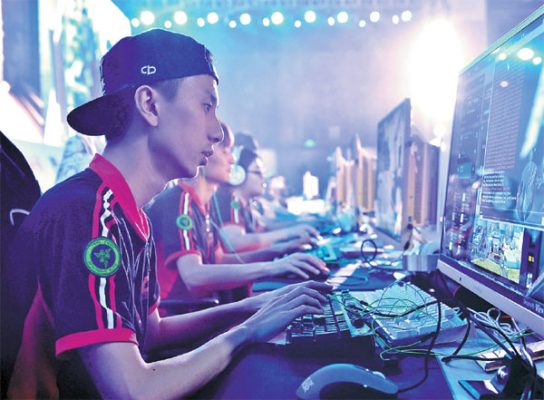
There are 170 million players and fans in China, surpassing any other regular sports, reports Ouyang Shijia
When Liu Zhenyan commentates live from the Jeunesse Arena in Rio de Janeiro, tens of millions of Chinese viewers tune in to watch the 2017 Mid-Season Invitational, one of the most important annual League of Legends gaming tournaments in the world.
Liu, known by her nickname “Su Xiaoyan”, is one of many popular esports commentators in China catering to a rapidly growing audience of young fans.
China has become a key esports market. Last year, the country generated 50.46 billion yuan ($7.3 billion) in revenues, up by 35 percent from 2015, according to gaming research institution Gamma Data Corp.
With hundreds of millions of players and viewers in China, the esports industry is booming, fueled by prize money from local tournaments, and supported by investors seeing it as the future trend.
Now, young fans are aspiring to become esports professionals.
Just a few years ago, teachers and parents would regard teenage video game players as bad students who will bring harmful effects to others, blaming video games for their addictive nature, similar to drugs or gambling.
That’s exactly what Chen Zhihao’s parents thought. But the other day, they spent hours watching their son play. The 27-year-old Chen has won several local and international games.
In July 2014, Chen was part of the five-member Newbee team, which won the world’s richest esports tournament – the $5 million International DOTA2 Championships in Seattle, Washington.
DOTA2, short for Defense of the Ancients 2, is a multiplayer game in which two five-member teams battle to break the other’s stronghold. Known as “Hao”, Chen now works for the esports club Vici Gaming in Shanghai. He fell in love with video gaming when he was little, around 6 or 7.After he graduated from high school, he stayed home for a couple of years, focusing on becoming one of China’s leading player.
“During that time, I would spend more than 10 hours a day playing video games. Without the boom of esports and the chance to be a professional player, I would probably stay in Guangdong province to find a normal job, earning thousands of yuan per month,” said Chen, who is preparing for the next round of DOTA2.
Chen told China Daily in a recent interview that the industry is growing fast.
“Before 2014, my annual income could reach 1 million yuan at most. After that, I was able to earn millions of yuan annually.
“Most of the money comes from the live-streaming platforms I signed with, the gaming prize money and the salary paid by the esports club I joined,” he said.
Different from regular video or online games, esports is deemed as a contact sport, except that games are played in a virtual environment. There are 170 million esports players and fans in China, a number surpassing any other regular sports, according to a recent report by iReseach Consulting Group.
The popularity of the game has also spawned lucrative hosting and commentating jobs. The earnings of esports hosts and commentators are closely linked to their fan base.
Wanna get popular? A thorough understanding of the game, talking styles and even good looks are crucial.
Once one ticks all the right boxes, he or she can be as popular as Liu Zhenyan or Chen Juan.
Chen Juan, known as “AMS”, is a commentator specialized in DOTA2.
After the tournaments, the commentators will also work as hosts on live-streaming platforms, earning extra money.
“In 2014, I got the chance to be an esports host and commentator right after I finished my undergraduate study. With the industry booming, now I can make more money than my college classmates”, said the 25-year-old Chen Juan.
For Liu, esports ignited her inner passion, and that’s the reason why she chose to be a commentator instead of finding a job in the media field, which she studied in college.
“High incomes always come along with high risks. And in all industries, the top talent will be able to earn fat salaries. And I just want to stick to the stuffs I am really into,” Liu said.
Although the earnings are closely guarded, it is estimated that top hosts can learn millions of yuan in salaries alone.
Unlike a few years ago, when there were only a few professional events with small prizes, now the esports industry offers dozens of domestic and foreign tournaments with handsome rewards.
In 2011, total prize money for esports competitions worldwide was just under $10 million, according to a report from online news portal sohu.com. By the end of 2015, it had skyrocketed to $64.5 million, a 551 percent surge from four years ago.
Attracted by the fat rewards, esports lovers, including even middle school students, are yearning for a career in the industry. However, only few gaming players can reach the top of the pyramid in this field.
Chen Zhihao cautions young aspirants against focusing solely on becoming professional players, saying “the success depends on both talent and good luck sometimes”.
Wang Xu, chief analyst at GDC, said: “Today, professional esports players’ incomes are polarized, and most players are at the bottom. Since the age suitable for playing esports is quite young, the players are getting younger, of which most are not well-educated and usually lack life experiences.”
Wang believes qualified esports professionals will be the key to the industry’s future development.
“Just like many other fields, esports needs talent,” Wang added.
“According to open internet data, the industry now needs 260,000 more professionals, including data analysts, competition operators, teachers for esports education and training, professional managers and content producers.”
That’s not all.
Xiao Hong, CEO of Perfect World Co Ltd, a leading Chinese movie and gaming conglomerate, says the industry is now in its early setup stages, which still need time to be more mature.
“Esports need regulations. There is still a long road to make the sports standardized,” he added.
Industry is bracing for exponential growth home and abroad
Esports, an umbrella name for organized competitive video gaming, is not what comes to mind when people think of sports.
That may change soon because esports is going mainstream, thanks to its recognition by international sporting organizations.
Last month, the Olympic Council of Asia announced esports will be included as an official medal event in the 2022 Hangzhou Asian Games in Zhejiang province in partnership with Alisports, the sports arm of e-commerce giant Alibaba Group Holding Ltd.
In announcing the move, the OCA said the decision reflects “the rapid development and popularity of this new form of sports participation among the youth”.
In addition, demonstration events will be held at September’s Ashgabat Asian Indoor and Martial Arts Games in Turkmenistan and at the 2018 Jakarta Asian Games in Indonesia.
Wang Guan, general manager at the esports division of Alisports, said the company would act as a technology provider and supporter to work with the OCA, helping plan and organize the competition as well as develop markets in Asia.
But he acknowledged there is a lot of work ahead.
“Take esports broadcasting for example. We will need people who really have a thorough understanding of the industry, not just experience in traditional sports broadcasting.”
The Asian Games, recognized by the International Olympic Committee, is the world’s second-biggest multisport event after the Olympics. In 2014, 45 countries and nearly 10,000 athletes participated in the Asian Games in Incheon, South Korea.
Wang praised the OCA move as “a bold step”, but warned it is not easy to achieve the ultimate goal of entering the Olympic Games.
Back in 2003, esports was officially listed as the country’s 99th sporting event by China’s General Administration of Sport, which distinguished between esports and regular online games.
With the appetite for online entertainment surging, esports is bracing for exponential growth both in China and abroad.
Seeing its potential, Alibaba invested more than 100 million yuan ($14.5 million) to organize the World Electronic Sports Games last year with a prize pool of more than $5.5 million, marking its ambitious goal to be an industry leader in the sector.
“The partnership with the OCA will help us better tap into the Asian market, making esports a widely recognized sport among those countries. Then we can better develop our esports brand in the global market,” Wang added.
The global esports market will be worth $696 million by the end of this year, with a year-on-year growth of 41 percent, according Newzoo, a gaming intelligence provider headquartered in Amsterdam.
This year, the global esports audience will reach 385 million, consisting of 191 million enthusiasts and 194 million occasional viewers, Newzoo said in a report. And the number of esports lovers is expected to rise by another 50 percent to 286 million by 2020, it added.
Tang Hua, director of the esports division at the General Administration of Sport information center, said esports will play an important role in enriching traditional sports events.
“Esports is an emerging internet sports, which has gained popularity among youngsters. It will improve players’ thinking ability, reaction capability as well as learning the team spirit. Simulating various environments in the real world, players are able to obtain abundant experiences,” Tang said.
“I believe esports will be recognized by more people and be boosted further in the future.”


